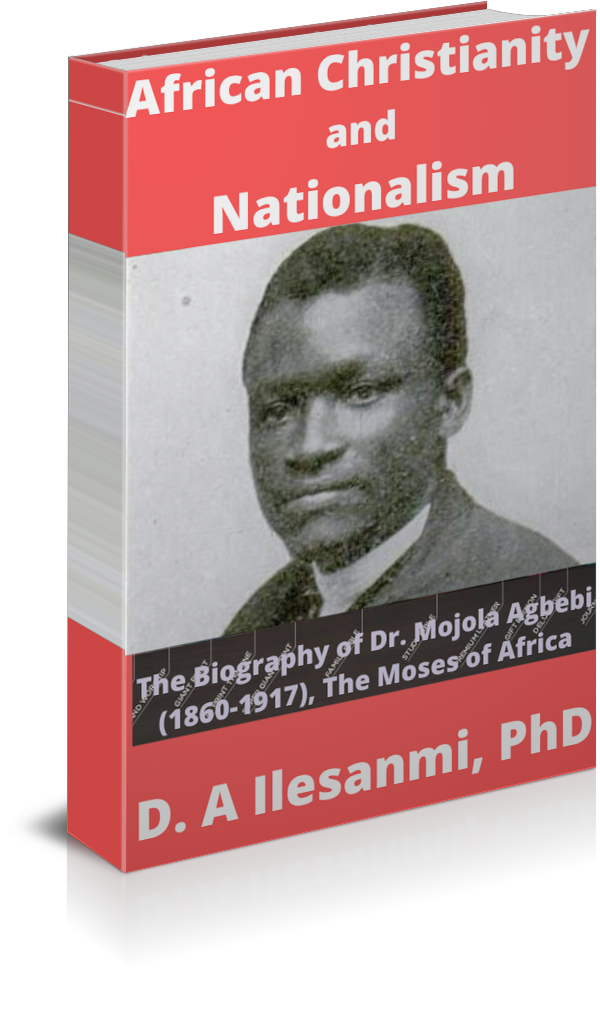African Christianity and Nationalism: The Theology and Philosophy of Dr. Mojola Agbebi (1860-1917), The Moses of Africa
- By Pastor Dele Ilesanmi, PhD
- Published in Christopress Blog

Rev. Dr. Mojola Agbebi was born on the 10th of April, 1860 in Ilesha. He was the son of a Yoruba Anglican catechist from Oye-Ekiti in the present Ekiti State, Nigeria. He was a leading proponent of “Ethiopianism,” which advocated an African-centered Christianity). He studied for the ministry in the Baptist Mission. In the 1880s, as an indication of his full acceptance of African culture, he changed his Creole name, “David Brown Vincent” to Mojola Agbebi. “In 1888, Agbebi was a founder of the Native Baptist Church (now the First Baptist Church), in Lagos, Nigeria. Later that year, he helped to establish the Ebenezer Baptist Church in that city (Lagos, Nigeria). And that same year, at twenty-eight years of age, he founded the Hope Institute, an agricultural and technical institute that received the backing of the Educational Board of Lagos. A year later, he published his first book, “Africa and the Gospel”. Agbebi was one of the first Africans to hold a degree in civil engineering from a British university and the first black man to be honoured and awarded Master of Arts (M.A) and Doctor of Philosophy (Ph.D.) for his racial fidelity, literary prowess, and scholarly works, but he was primarily known for his missionary work in southern Nigeria and the Cameroons between 1890 and 1910. Dr. Mojola Agbebi became the most outstanding product of entirely West African institutions of learning. His belief in Ethiopianism is outlined in his 1902 Inaugural sermon.

Rev. Dr. Agbebi Mojola (1860-1917), B.Sc., M.A., Ph.D., D.D.
The London press underscored Mojola Agbebi’s reform activities, and quoted a reference to him in the Lagos press which had described him as “holding a prominent place among the intellectual, moral and religious personalities of that colony, his youth, manhood, education, intelligence, literary and domestic struggle, his plodding career being all local and well-known.” But, it was at the sixth session of the Universal Races Congress, held in London in 1911, that Agbebi established himself as a scholar and lecturer of international stature.
He frequently used his pulpit to deliver anticolonial sermons, which was also a common feature of his poems, for which he was hailed as the uncrowned poet laureate of Lagos. Dr. Mojola Agbebi was an icon in the agitation for Yorùbá dress and language. He challenged the missionaries’ right to name the particular tune, language, drums, dress, and songs that would be conducive to worship in another culture. He believed that worshippers can use any tune, language or dialect, drums, songs, and wear clothes suited for them to worship their God. He argued that dress, tunes, and songs depend on the frame of mind, the breadth of soul, the experiences of life, the attitude of faith, and the latitude of love of the individual within a sociocultural space. Dr. Agbebi Mojola cited Biblical verses in support of his theological idea that individual culture should be permitted to dictate the dress, songs, language, etc. of worship.
Between 1880 and 1914, he sat on the editorial chairs of nearly all major Lagos newspapers. He was an astute editor, an excellent writer, and a fine preacher of note. No doubt, Dr. Mojola Agbebi created one of the most powerful “Africanization” movements of Christianity in colonial West Africa
The emergence of this Ekiti illustrious cerebral mini-Paul, “the Moses of African Christianity and pan-Africanism and nationalism”, Dr. Mojola Agbebi, like a meteor in the firmament of Christian missions in 1889 with his hard-hitting work titled “Africa and the Gospel”, his vitriol of tongue and pen became galling to the negrophobic American missionaries. His intellectual apogee was in his expository paper titled “The West Africa Problem “at the Universal Racial Congress held at the University of London. This, in no doubt, with other vituperations, coming from African intellectual caterpillar, Dr. Mojola Agbebi, with his sole aim to lead his people to Canaan land, away from the Babylonian captivity of European-American racial and cultural imperialism, mental enslavement, and spiritual subjugation, gave the American missionaries a coup de grace that eventually brought them to their knees.
In 1902, Rev. Dr. Mojola Agbebi who was the Director of Ekiti Baptist Mission received in Lagos the first set of converts from his own Ekiti country church, First Baptist Church, Igede-Ekiti to be baptized. Those who participated in the baptismal exercise in Lagos were the following: Daniel Amoloye, Daniel Ayo, Famoroti John, and D. Okebiorun. Other prominent early converts into the fold of the Baptist prominent personalities were later baptized in the town.
The climactic recognition of Mojola Agbebi as the personification of the African Personality came directly from the United States of America when The Men’s Sunday Club of Yonkers, New York, observed October 1, 1911, as “Agbebi Mojola Day.”
Indelibly remarkable was his work, unfortunately, though, the sudden demise of this intellectual juggernaut on Thursday, 17th May 1917 made his incorrigible dogmatic theologies and philosophies in the Southern American Baptist fold in particular and Africa, in general, remained a spent force. Dr. Mojola Agbebi will be remembered as a champion of cultural nationalism and as a Church leader who articulated an authentic African Christianity and/ or theology.
The question now is: who shall go for Africans again in this present dollarisation of Africa, the bastardisation of culture, racial imperialism, and persistent religious bigotry? Read more on Dr. Mojola Agbebi here
To know about Dr. Mojola Agbebi’s foster father, read the article here by the same author
.
Share this:

